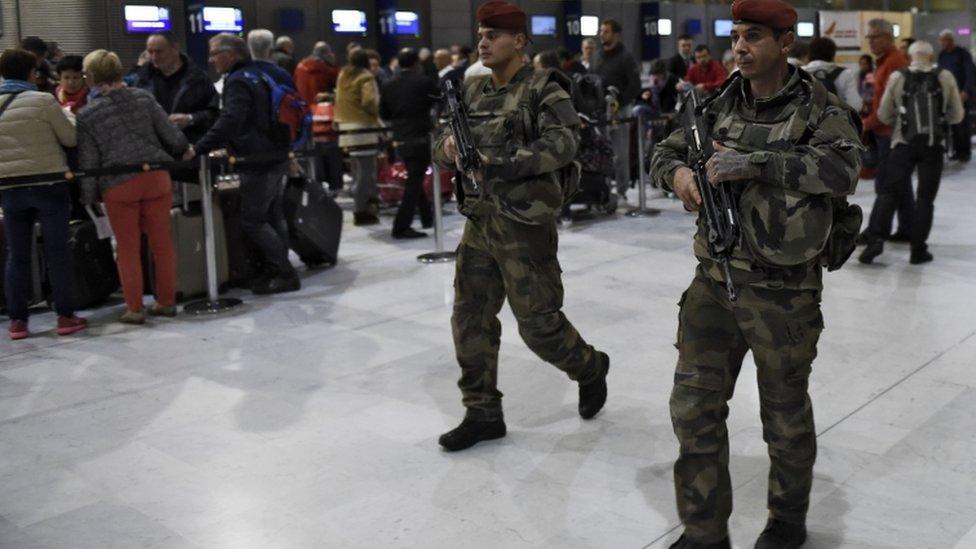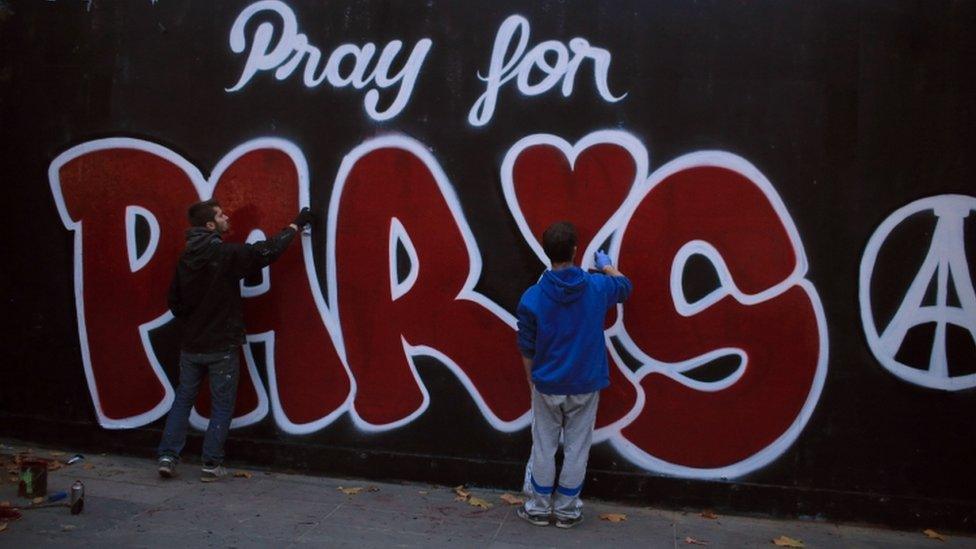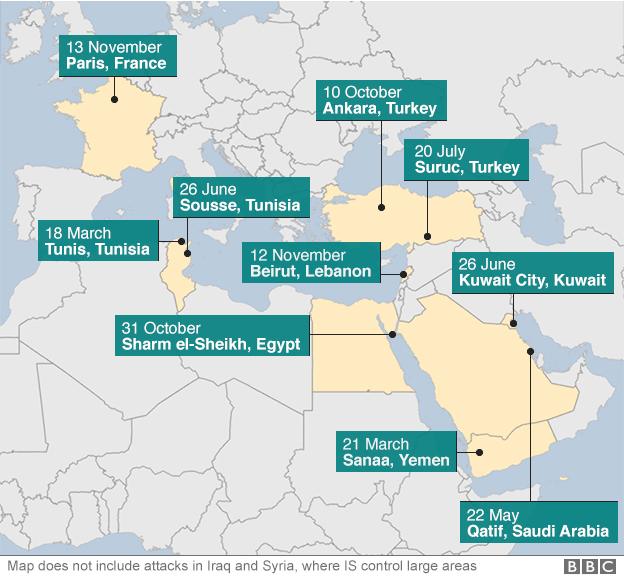Paris attacks: Islamic State militants change tactics
- Published

Security has been stepped up across France in the wake of the attacks
Friday's Paris assaults mark a new and frightening watershed in the steady expansion of attacks attributed to or claimed by the so-called Islamic State.
For most of last year and much of this, IS's focus has been on taking and holding territory in the Middle East. For its leaders in Raqqa and Mosul, that is still the priority.
But the militants are well aware of their transnational appeal to violent jihadists in Europe and elsewhere.
As they reel under the daily onslaught of US-led coalition airstrikes, haemorrhaging one leader after another, they are increasingly looking to direct or inspire attacks further afield.

Across France and beyond, tributes are being paid the victims of the attacks
Careful planning
In June, IS claimed a gun attack at a Tunisian beach resort in Sousse that killed 38 tourists, 30 of them British.
In October Turkey blamed a suicide attack killing 102 people in Ankara on IS. Later that month, IS's Sinai affiliate claimed to have brought down a Russian airliner, killing all 224 people on board.
On 12 November, IS claimed the bomb attack on the Hezbollah stronghold in south Beirut that left 44 people dead. And then came Paris, with at least 120 dead and over 300 injured.
These are not isolated, lone wolf, spur-of-the-moment attacks.
Although not necessarily difficult to execute, these attacks still took planning, preparation, training, sourcing of weapons and explosives, reconnaissance of the target and the careful recruitment of so-called "martyrs" - fanatical young men prepared to carry them out in the full knowledge they will probably die doing so.
This is far more reminiscent of al-Qaeda's modus operandi in the early 2000s, going for big publicity, high-casualty attacks that make headlines around the world.
Western counter-terrorism officials had recently come round to the conclusion that while there were still people aspiring to such grand-scale attacks, the prevailing threat was more likely to come from "self-starters", people like the murderers of British soldier Lee Rigby in Woolwich near London in 2013.
In the light of what has happened in Paris and elsewhere, they may now be revising that assessment.
Closing the window
There is also another factor here. The 1000-mile (1,600km) Turkey-Syria border used to present little obstacle to the thousands of would-be jihadists coming from Europe to swell the ranks of IS.
While the border is still porous in places, much of it on the Syrian side is now controlled by the YPG, a Kurdish militia opposed to IS.
So the "window" through which new recruits can cross has narrowed considerably. Iraq is not a realistic transit route for European jihadists to reach Syria, Jordan's border is closed and in Lebanon there is a high risk of being caught by security forces.
The net result is that IS's online recruiters have recently been encouraging their followers to stay in their own countries and plan attacks there, rather than attempt the risky journey to Syria.
In the short term at least, this will translate into a heightened chance of terrorist attacks here in Europe.

Bloodiest attacks in 2015 linked to 'Islamic State'

13 Nov - Paris, France Gunmen and suicide bombers kill at least 129 people.
12 Nov - Beirut, Lebanon Suicide bombers kill at least 43 people.
31 Oct - Sharm el-Sheikh, Egypt Plane crashes killing all 224 on board. Russia says a bomb caused the crash and an IS affiliate says it was responsible.
10 Oct - Ankara, Turkey Suicide bombers kill 102 people at peace rally. Turkey blames IS, but no group claims the attack.
20 Jul - Suruc, Turkey Suicide bomber kills 33 people.
26 Jun - Sousse, Tunisia Gunman kills 38 people, mostly British tourists.
26 Jun - Kuwait City, Kuwait Suicide attack kills at least 27 people.
22 May - Qatif, Saudi Arabia Two suicide bombs kill at least 21 people.
21 Mar - Sanaa, Yemen Suicide bombings kill at least 137 people.
18 Mar - Tunis, Tunisia Gunmen kill 19 people, mostly foreign tourists.